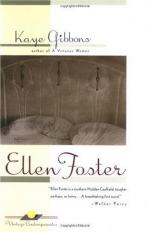|
This section contains 7,031 words (approx. 24 pages at 300 words per page) |

|
SOURCE: “Re-visioning the Wilderness: Adventures of Huckleberry Finn and Ellen Foster,” in Southern Quarterly, Vol. 37, Nos. 3-4, Spring, 1999, pp. 187-97.
In the following essay, Groover contrasts the quests in Gibbons's Ellen Foster and Mark Twain's Huckleberry Finn.
Persons attempting to find a motive in this narrative will be prosecuted; persons attempting to find a moral in it will be banished; persons attempting to find a plot in it will be shot.
—Author's note [Adventures of Huckleberry Finn]
Mark Twain's disclaimer notwithstanding, Huck Finn's journey down the Mississippi is linked—by motive, moral, and plot—with a pervasive tradition in American mythology and literature: the notion that quest, the lone journey into the wilderness, forms the quintessential American experience. In his 1954 work The American Adam, R. W. B. Lewis describes the protagonist at the center of this myth as “a figure of heroic innocence and vast potentialities, poised at...
|
This section contains 7,031 words (approx. 24 pages at 300 words per page) |

|


